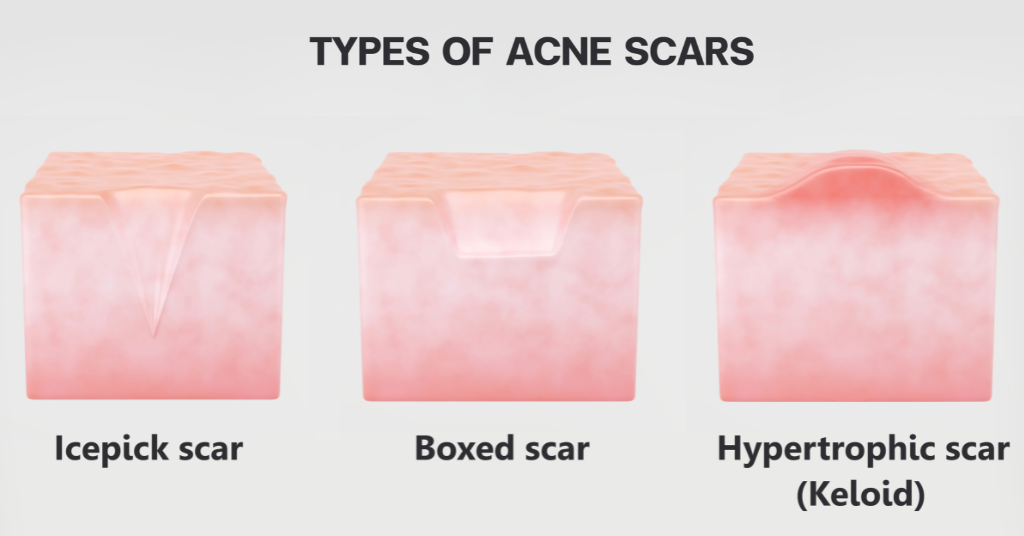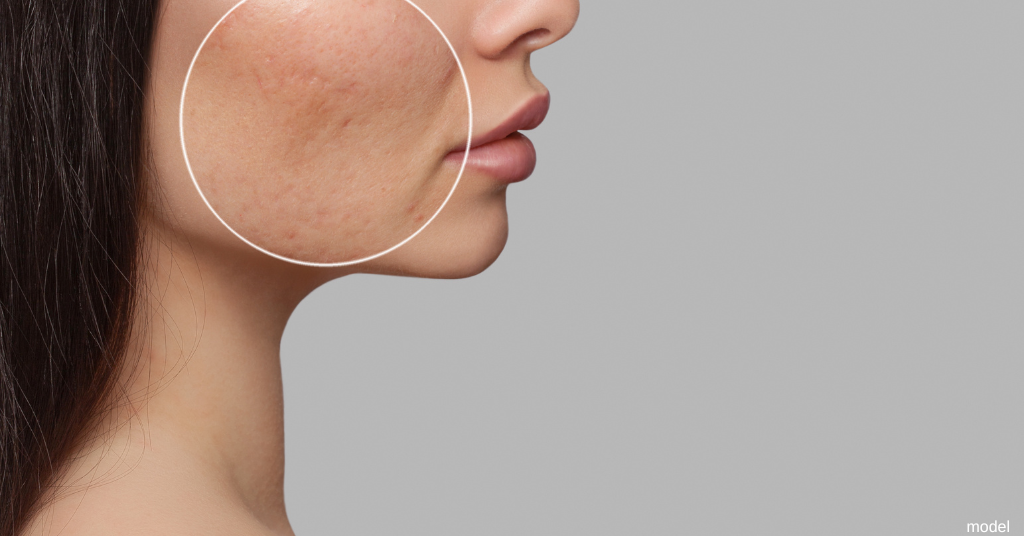As many Houston teens and adults have learned, acne can be frustrating because it’s difficult to treat and often leaves troublesome scars in its wake. Some of them try topical scar treatments without significant improvement, or they just learn to live with their scars. But there are many effective ways to improve these scars, depending on your type of acne scar.
If you want to find the best acne scar treatments, our team outlines a few options below based on our years of customizing acne scar treatment plans for our patients.
What Type of Acne Scar Do I Have?
The first step in your acne scar treatment is determining your scar type.

Ice Pick Scars
These scars occur when your acne impacts the area underneath your skin and creates tissue loss. Ice pick scars are deep, narrow in shape, and may look like an ice pick pierced your skin. These scars can be challenging to treat, depending on how deeply entrenched they are in your facial tissue.
Treatment Options for Ice Pick Scars
Based on the extent of your scarring, your provider will help you choose a treatment that’s best for you.
- Punch Excision: Your provider will use a punch tool to remove the scar tissue and close the wound with sutures. This treatment can only be used for smaller, shallow scars that don’t have any hyperpigmentation. If you have hyperpigmentation on your ice pick scars, you can follow up your scar excision with laser skin resurfacing to remove the pigment.
- Punch Grafting: If your ice pick scars are broad and deep, you can try punch grafting treatment. Similar to punch excision, your provider will remove scar tissue and replace the hollowed area with a skin graft, usually harvested from behind the ear. Punch grafting may leave a small, flat scar after the procedure.
Boxcar Scars
Often associated with cystic or nodule acne, these round or oval scars form a depression on your skin and occur when inflammatory breakouts cause collagen breakdown. When facial tissue is lost due to collagen breakdown, the surface skin develops a depressed area. The extent of the depression can vary depending on the amount of lost facial tissue.
How To Treat Boxcar Scars
At our practice, we offer several great options to treat boxcar scars.
- Dermal Fillers: This is probably the most common treatment option for boxcar scars. Dermal fillers can be used to fill in indentations from beneath the surface of the skin. Once the filler is injected into the skin, it plumps and smooths the skin, minimizing the appearance of your acne scar. Fillers such as JUVÉDERM®, Restylane®, or Sculptra® Aesthetic can work well on boxcar acne scars. Your provider will advise you on the best type of filler for your scar.
- Laser Skin Resurfacing: Laser skin treatments are great not just for boxcar scars but any other type of acne scarring. Laser treatments stimulate collagen production, an important element in developing firm, smooth, healthy-looking skin. The laser also can break up the scar tissue and improve the appearance of your scar.
Hypertrophic and Keloid Scars
These acne scars resemble firm bumps and grow above the surface of the skin. Hypertrophic scars develop on only the acne-damaged skin, whereas keloid scars can spread beyond the original margins of the cyst or pustule. Hypertrophic and keloid scars occur due to an overproduction of collagen in the skin.
What You Can Do To Minimize Hypertrophic and Keloid Scars
Several options are available to treat these scars, but we list a couple of common treatments below.
- Microdermabrasion: This treatment is effective in improving the appearance of hypertrophic scars. During your microdermabrasion treatment, your provider will gently remove the top layer of your raised scar to reveal fresh, new skin underneath. You can also achieve a more even appearance in the skin surrounding your acne scar.
- Pulsed Dye Laser Treatments (PDL): Keloid scars may be improved with the use of a pulsed dye laser. This treatment targets the area with a concentrated beam of light that fades and flattens the scar. Your provider may recommend several sessions to achieve your desired results.
These are only some of the treatments available to improve acne-related scars. For even more treatment options, read this previous blog post.
Acne scar treatments can be varied and confusing, but our team at Derm Surgery Associates can determine the type of scar you have and help you pick the right treatment. We carefully review your skin concerns and will work with you to achieve the best outcome. If you are ready to improve your acne scars and enjoy smoother skin, request a consultation or call us at (713) 791-9966 to schedule an appointment.


Leave a Reply